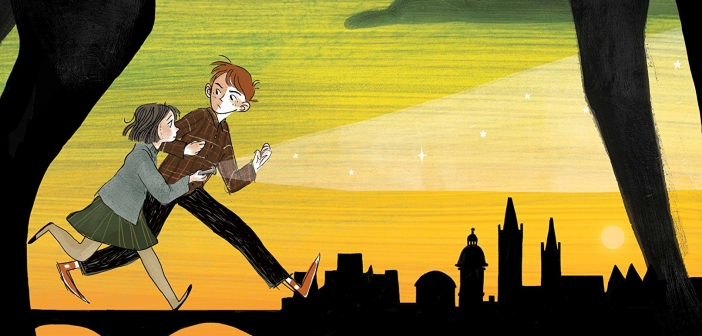Brilliant by Roddy Doyle is … an interesting book. Honestly, I’m not sure what to make of it. It’s a middle grade novel set in Dublin and stars the children Raymond and Gloria. These siblings are concerned because the adults around them have become noticeably sadder. In reality, the adults are dealing with the hardships of the economic depression, which has led to many cases of emotional depression.
 However, what the kids overhear makes them believe there are supernatural forces afoot. When the grown-ups speak sadly of “the black dog of depression,” the children assume that it’s a literal dog that has caused nationwide depression by stealing Ireland’s funny bone.
However, what the kids overhear makes them believe there are supernatural forces afoot. When the grown-ups speak sadly of “the black dog of depression,” the children assume that it’s a literal dog that has caused nationwide depression by stealing Ireland’s funny bone.
That premise alone is strange enough, but then this theory that the kids half made up turns out to be completely true. Gloria and Raymond go out one night and actually find the enormous dog that’s caused everyone’s depression. Naturally, such an enemy is dangerous to fight. Getting too close to it can make you lose yourself to depression.
Luckily, the kids discover that they can fight back by saying the word “brilliant” (as in “cool” or “great”). This word brings light and happiness to everyone who hears it and makes the dog lose its powers. Soon Gloria and Raymond are joined by the other children of Dublin whose loved ones have fallen into depression. They all chase the dog and shout “brilliant” at it to destroy the beast and retrieve Ireland’s funny bone. They also have a friend who’s a vampire, but only professionally.
This book is absolutely ridiculous. It has one of the most random plots I have ever come across. Still, Brilliant largely gets away with this randomness because it’s actually a very charming book. The writing style is simple but captivating, easily conveying the minds of young children. The story also has a wonderful atmosphere of whimsy to it, so when things like a random vampire appear you’re likely to say, “Huh. Sure, why not?”
The problems with Brilliant start to emerge when you think about it more broadly. This feels like a teaching book, but what’s the lesson? Is it supposed to be about the nature of depression? The book does a good job in certain spots of describing how depression feels in kid-friendly language, but that’s the extent of it. Aside from that, depression is presented as a condition that can be fixed if one is just determined and “brilliant” enough.
These are children who not only cure countless people of a mental illness but also apparently fix Ireland’s economy overnight by shouting a single word. That … that’s just a grossly irresponsible message to send. Many kids live with family members with depression. How is this book supposed to help them? Being cheerful isn’t going to cure the people they love and that realization is only going to cause the children more pain. People with depression constantly hear about how our illness is just in our heads. We just need to “think positive” or “get out more.” And I get it; that can be helpful advice if someone is simply sad. It’s not a cure for a mental illness. Trust me, we do try to be positive. We try to think happy thoughts. We push ourselves to spend time with friends. We take up yoga. We try. We are constantly trying. Unfortunately, depression is still a medical issue and it needs medical treatment. The laughter of children isn’t going to change that any more than a motivational poster would.
Overall, I think Brilliant has some good ideas and wonderful writing going for it. Unfortunately, it falls flat when it comes to having any constructive meaning.


3 Comments
This review is particularly timely for me because I’m translating a YA novel from Portugal that also portrays a parent’s emotional struggles during the current economic crisis. I’m glad that the Portuguese novel doesn’t present such facile solutions because I live in Portugal part of each year and have seen the genuine suffering that has come from the crisis and the government’s ill-advised austerity. I also know from personal experience that unemployment, job insecurity, and abusive work conditions can exacerbate depression. Just as cheerfulness won’t cure depression, it won’t cure economic insecurity and inequality.
WIsh fulfillment fantasy, and unfortunately not so easy in real life. Still good intentions, and maybe with time we can get a bitter glimpse at clinical depression in children’s literature.
I have had clinical chronic depression since childhood and I have written a children’s picture book about a kid with depression. The kid colors in only black and red. Then he gets help and adds green to his drawings. It is currently being considered by a publisher. I should know in January about whether it’s a go or not. The publisher has acknowledged having depression herself so she understands the book’s concept. I will let you know what happens.